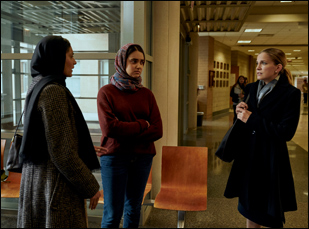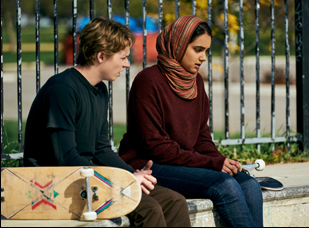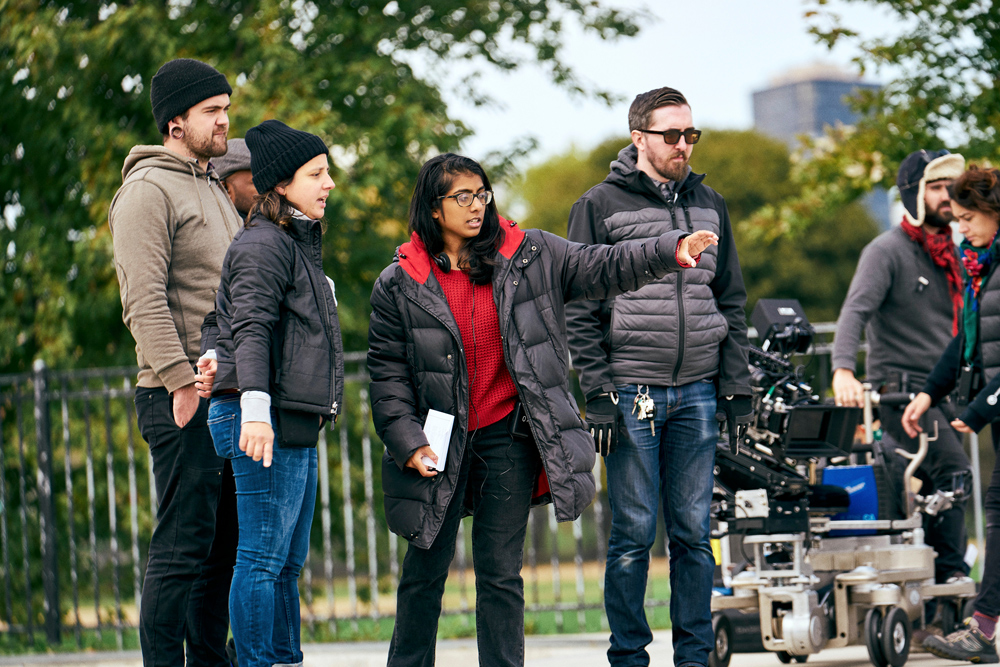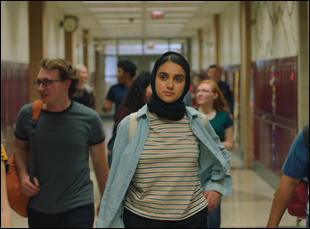One of the great underlying pleasures of “Hala” is to see it arrive uncompromised when so much of Minhal Baig’s semi-autobiographical drama about growing up as a Pakistani-American teen in Chicago sees her onscreen surrogate (Geraldine Viswanathan) often suppressing her voice, occasionally reciting her poetry or sharing her thoughts on “A Doll’s House” with the encouragement of her English teacher (Gabriel Luna) but largely keeping to herself in the socially fraught trappings of high school, and deferring to her parents back home, who may have fled Karachi, but kept many of the most conservative tenets from their Muslim faith intact.
However, the writer/director cunningly finds that Hala is hardly alone in feeling unable to express herself fully, as everyone in her orbit seems to be adopting a bend but don’t break policy towards comporting to cultural standards that don’t entirely align with personal beliefs as her father Zahid (Azad Khan) enjoys seeing her having the freedom to skateboard to school as long as it doesn’t involve boys – he insists the choice of her husband will be his rather than hers, adhering to tradition – and her mother Eram (Purbi Joshi) buying her flannel shirts that at once nod to the modesty required by their religion and to American teenage rebellion, albeit a couple decades after grunge was truly in vogue.
Of course to tell a story in exactly the way she wanted to, Baig had to make some sacrifices, making the film more personal than she expected to, earning more creative leeway through filming on an unforgiving schedule that allowed little room for error, and (famously) not telling her mother that she was making a film until its premiere at Sundance, depriving them of dinner table conversation that could possibly muddy the waters. Yet the end result is to see an artist come into their own as thrillingly as one witnesses Hala harnessing her inner strength to form her own worldview and trust it, with Baig beautifully observing how the tables turn from the world impressing itself upon Hala, coming around to see the perspectives of others such as her mother and her classmate Jesse (Jack Kilmer), to her making an impression on it.
Ever since its Park City premiere earlier this year, “Hala” has been leaving its mark on audiences as a truly unforgettable coming-of-age story and is helping the new streaming service Apple TV+ come out the gate strong as their first original narrative feature release. At the Toronto Film Festival, Baig spoke about building upon her short film from 2014 to make her searing sophomore feature, visually articulating infatuation and influence that exists abstractly, and how the casting of Viswanathan, the breakout star of “Blockers” who gives a radiant performance here, changed the tone of the film.
It was something that I had been gestating on for a really long time, and it wasn’t until I made this short film in 2015, where I started to get a sense of what the feature would be. The short was focused on this relationship between Hala and Jesse, so I thought, ”Okay, I’m going to make the short and then make the feature” – I had a script written [already], but then when we made the short, I rewrote the feature because I learned that people were responding so much to the family. And the process for “Hala” actually started when I went back home in 2013. My father had passed away and it was a big, big loss in my life and it was this really difficult time where I thought I was going to be home for about a summer and it ended up being two years. We were all dealing with our emotions and grappling with our grief and a lot of things had to happen for me to feel that it was okay to make this movie reminiscing about what happened in my childhood, pieces of my childhood being in this fictional film. But it’s been a long time coming and now I felt like I can make “Hala.”
I had heard the initial idea was actually a Muslim living in France. Did something click to give yourself permission to tell this story closer to yourself?
Yeah, I was always keeping it really arm’s length because it felt safer to do that, but as I was revising and changing the script based on the short film, it became really clear to me that it had to be much more personal and more authentic to my lived experience. It was still going to be a fictional character no matter what because I needed to be able to tell the story of Hala and not tell the story of me, but it was the process of going through that grief and spending time with my family that was helpful in feeling like it was okay to make the movie closer to home. And it was painful to write sometimes because it felt too close to home, and then even when we were filming it there were certain scenes where the dialogue was literally lifted between me and my mom in some scenes, and that brought me back to that place of what it was like to have that conflict. It was strange to relive it through making the movie, but I think in the process of doing all of that it made the film feel more emotionally honest and true.
Even though this is fiction, is it interesting to have authorial control of retelling these events and expressing them cinematically?
It’s hard because the first drafts of the things are always almost feel like transcripts and then you’re like, “All right, it’s not a documentary. This is a different character and she is going on her own journey.” So in the writing of it, a lot of the dialogue would change, also because it took so long to make the film. I was learning more and growing as a filmmaker as I was In the process to finance the film and the long time it took to write the movie. Then when we were on set shooting some of these scenes, they were still evolving because now Geraldine and Purbi [Joshi] and Azad [Khan] were bringing so much that was different than what I expected but also exactly what the story needed, so it was changing with them and evolving and becoming much more than what I had originally anticipated when I was writing.

In the case of Hala, the character as written was very self-serious and shy and more restrained. When we cast Geraldine, she embodied all of that and was able to visually manifest this highly internal conflict but at the same time, she brought this levity and lightness to the character that’s coming from her comedic background. We wanted Hala to be likable and someone that you could root for even as she’s making mistakes because she’s a teenage girl. That little bit of buoyancy is something Geraldine brought that was very necessary for the character.
Did seeing the light that would come out of Geraldine change the way that you wanted to relate to her with the camera?
Yes, because it’s an independent film, so we always have to shoot very economically and we had to decide, how are we going to get into this scene and how are we going to get out? We’re always following Hala’s emotional throughline and thinking about where is she in the scene and how is she responding? We found that when we got to set and we stayed on her, we got almost everything and we didn’t need as much because she conveyed so much. In the process of shooting those scenes it was like, “We can stay on Hala here, we don’t need to cut away because it’s enough to see how she responds even non-verbally. We get it.” I actually found that when I’m writing I overwrite and then I shoot it and I take out dialogue in the edit because you don’t need to explain as much. It’s a visual medium and you can live in the quiet and let something extend longer than you think it needs to and the audience will go along for the ride. I often have to fire myself as a writer a little bit and be like, “We’re always preserving the spirit of the scenes because I’ve labored over them so much and I know exactly what they mean, but in editing it we find places where we don’t need the words to convey what the image already does.
You mention Hala as a character who makes mistakes, and admittedly, I found myself quite angry at one specific decision she makes, but I’ve come to decide that that was my issue rather than one for the film when I realized how ingrained this idea of the model minority was for me. When you were navigating through the development process, did you face resistance for this?
Writing the first few drafts of the film, as many people write their characters, there was this need to protect her and always make her feel like she was incapable of wrongdoing. Then I just didn’t feel like that’s very honest to who Hala is. She’s 17 years old and teenagers make mistakes, so I wanted to also give her space to be imperfect because often times when we have films with women of color being represented on screen there is this expectation that they need to be perfect, and I just wanted to reject all of that. She’s a teenager like everybody else and she needs the space to be able to make mistakes and to grow and learn from them. She is also coming from a very conservative background and sheltered from many things, learning about who she is and struggling with not really being able to talk to anybody about it, so I wanted all of that and not always be perfect and likable at all times because I needed her to have all these complexities for her to feel like an accurate reflection of the people I grew up with.
Something else that I thought must’ve been a challenge, but is so ultimately rewarding is how you see Hala and Jesse, played by Jack Kilmer, fall in love with each other’s ideas, which is so rarely expressed in romances. Was that difficult to articulate?
I’m so glad you talk about this because Jesse was always written as a very emotionally sensitive young man and I really wanted him to be different than more performatively masculine teenagers where he has a great sensitivity and vulnerability. That’s what draws Hala to him because they have this love of ideas and language and I wanted that to be the connective tissue between them. Obviously, he’s still a teenager and in many ways he’s immature in the same way that she’s also immature at times. But it always made sense to me that this was a relationship that was very important and pivotal in Hala’s life, but it wasn’t going to be for forever. It was going to be a first romance. It has the beginnings of something incredibly beautiful and intense and then it peters out and you grow up and you drift apart and you learn that was really beautiful for what it was and now I am a different person.
What was it like to create that scene in the park where they walk and obviously start falling for each other?
The park scene is very different from the rest of the movie in many ways in the way that we shot it. Almost everything else, Carolina and I storyboarded together and we had a very controlled camera, but that was the first time that we really broke that rule and we went all handheld because it was this first liberated sequence for Hala. We really wanted her to play and the camera to play and follow them, so we had just the rough blocking and I spoke to the actors ahead of time, [saying] “This is roughly what we’re going to do,” but that scene required minimal direction because they just brought this instant energy and chemistry. Then we had our camera operator running around and chasing them. We did that a couple times and when we cut the scene together, it was one of the most fun things for our editor Saela [Davis] because I saw multiple versions of that scene and they all looked so different.

One of them was this moment where Hala tells Jesse that he’s so cool, and in the script that whole scene is as written but the way that Geraldine delivers that line was very unexpected. I had to watch that take a lot of times before I decided on it because it felt really real that she’s not the coolest slickest person and she would say something like that. But the greatest discovery was really Geraldine — the range that she has and moves through the movie is very beautiful. You have a lot of compassion for her because of how she plays this character, and I had one way that she was written on paper, but it was so much of a collaboration between me and her and also Purbi and Azad to make them feel like a family. For them to be speaking Urdu at home and for her to be responding in English, all of that was in my head, but it felt very academic and then on set it was lively and real. I love that we let it take shape on set and weren’t afraid to change things if we were like, “This doesn’t feel that real,” or “She would do it this way.” It was very much a collaboration with the actors.
You also make the act of writing quite cinematic, which must be hard to figure out. How did you go about it?
We went around it. [laughs] I There was always the scene in the movie where she’s reading the poem to the class and that kicked everything off. Then we had another part of the film where there’s a piece of voice over that’s also poetic in nature, so as we were making the edit together, Saela and I were realizing that is a very important part of the film that there’s all this internal conflict and the only place that she can put it down is in these words. But after that first time when she says it to the class, we don’t hear her saying it to anyone else. We don’t see her writing except for in the bus scene and I don’t like listening to [voiceover] when you see characters writing stuff, so it was enough that we know that it’s an ongoing thing for her and she is very much in love with words and ideas. It was a challenge to write that because she couldn’t be [good enough to be] a publishable poet. She had to be a good poet for 16, 17 years old. And I had to write that. But thankfully I had some experience because I was a slam poet in high school, so I brought a little bit of that, [though] I was looking back at old slam poetry and I was like, “My God, Hala’s way better than this.”
Is there a time when you have to go back and you dust off the things under your bed for this?
Yes. I actually recently found my old LiveJournal from high school and it is full of the most Hala of things. I didn’t even realize I had them until more recently because I saw I still have a login. It surprised me how accurate it was to the movie because it really does land in a place of where teenagers think they know everything but they don’t know everything, and they think of themselves as mature in their relationships with other people take on this heightened serious intense quality. It was literally a whole thing like, “I only got into three AP classes when I asked for five. There was a conflict with AP chemistry and I have to take music but I really wanted to take AP chemistry.” I was like, “Whoa, this person is really intense, incredibly self-serious, and thinks of herself as an adult.” I’m a very different person now, but it was very much true to who Hala is. She carries herself with so much seriousness, but she has a lot of heart and she’s an old soul — and she’s also a teenager, so you look back at it and you’re like, “This is hilarious. I love the 17-year-old version of me. I want to protect her forever.”





